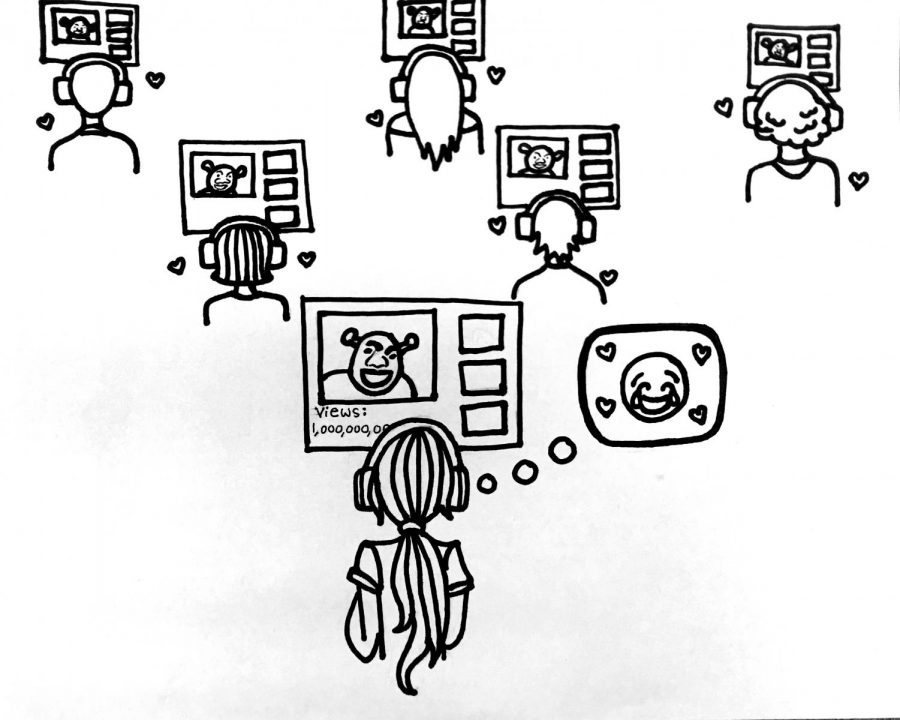OPINION: ‘Meme status’ is beneficial for music
Meme songs can be spread in seconds, to mass amounts of viewers, virtually everywhere.
The rise of the internet meme has significantly shaped the way humans put out and receive humorous content, including parodies of classic songs. Some favorites among meme enthusiasts include “boulevard of broken memes,” “crawling in my crawl” and ”I bless the memes down in Africa.”
“All Star” will perhaps forever be remembered by future generations and historians as a “meme song.” From an artistic standpoint, this is a mark of shame—not only for the song but for the musicians themselves. But is meme status really all that bad? When broken down, there are actual benefits for musicians whose songs become memes.
Memes can actually revive songs from past generations so today’s youth can enjoy them in new ways.
On March 24, 2016, Yahoo! News published an interview with Ben Affleck and Henry Cavill regarding their roles in the blockbuster film “Batman V Superman: Dawn of Justice.” That same day, Youtuber Sabconth uploaded a parody of the interview, titled “Batman V Superman – Sad Affleck.” In the video, the camera zooms in on a dejected Affleck while Simon & Garfunkel’s classic 1964 song “The Sound of Silence” plays in the background. The video went viral and the song’s popularity skyrocketed.
“The Sound of Silence,” which spent two weeks on the Billboard Hot 100 back in 1966, was No. 6 on the Hot Rock Songs chart in 2016. It only took 50 years—and a “meme come true”—to revive a song whose legacy dates back to the Civil Rights Movement. Now, the song’s famous opening line “Hello darkness, my old friend” is almost universally recognized and used to poke fun at moments of sadness and failure.
Returning to Smashmouth’s “All Star” (because it is hard not to), many YouTubers have found unique and creative ways to recreate the song. Among them is Joe Jenkins, a musician who has covered “All Star” with everything from a one dollar piano, an “orchestra of dollar store instruments,” and Chuck Taylor All-Star shoes.
While Jenkins ironically claims to not be a meme channel in his channel description, his content has garnered over 52 million views and continues to delight audiences with its musical creativity. Jenkins is the epitome of those who add a creative twist to revitalize old songs. And the best part: it is universally funny. There is nothing downgrading or sinister about it.
If anything, Jenkins’s work only perpetuates the legacy of the songs he covers. Moreover, the exposure he and other “memers” give to songs can also give musicians a boost in revenue. Making a living in the music industry is not easy. But by using memes as a tool of music promotion, one can garner instant popularity and viewership.
In an article by The Hoya, music critic Anthony Fantano pointed out how musicians can establish closer connections with their fans by embracing meme culture.
“When artists embrace the meme, it creates these opportunities for interactions with their fans,” Fantano told The Hoya. “If you have people memeing, I would say embrace that fully. Take part in it, because… that is a signal… there’s a community out there having fun with what you do.”
Memes may be the future of music promotion. They will also continue to add new life to classics. But music purists still criticize them for giving songs a negative connotation. Indeed, all artists want to be remembered by the aesthetic significance of their work, not by a funny image spread across the internet. A major concern among music purists is that memes will downgrade the original versions of these songs and leave a negative impact on their legacy. But remembering that memes perpetuate happiness, virality and viewership go a long way in understanding their merits.


